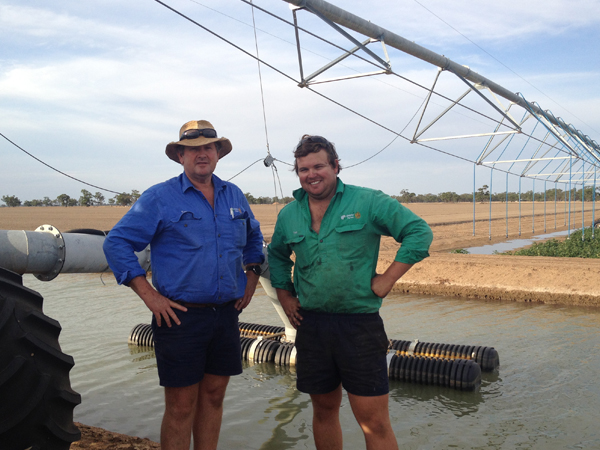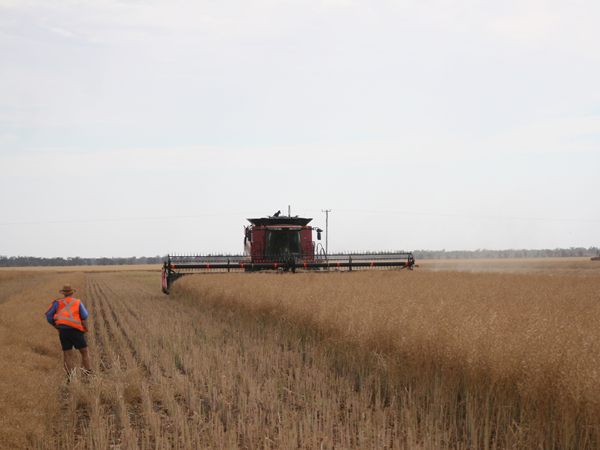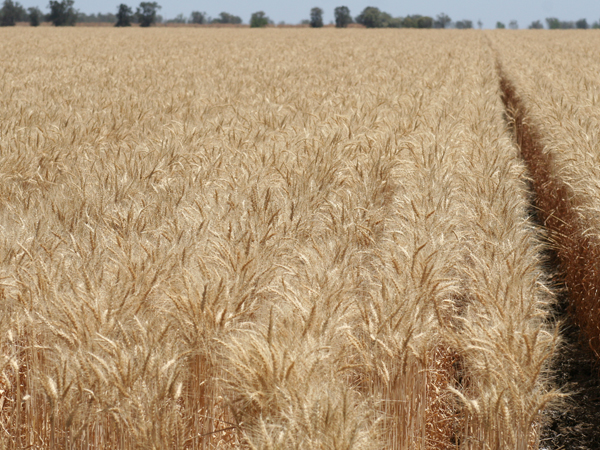Farmers and communities benefit from collaborative modernisation
By Meg Strang, NSW Department of Primary Industries
The Quigley family at Nevertire in western New South Wales has made some big changes in recent years to the way they run their farming operations – and they’re not alone.
Throughout the local irrigation community, funding provided through Commonwealth and State Government assisted schemes has seen extensive modernisation of infrastructure and equipment, and farmers are working together to make the most of the new irrigation systems that have evolved through this process.

Funding from the STBIFM program helped Tony and Tom Quigley laser level fields to improve the efficiency of their over head irrigators (Image supplied by S Quigley).
“Three years on from the changes we implemented with the help of the Sustaining the Basin: Irrigated Farm Modernisation (STBIFM) program and other similar funding programs, the new infrastructure is starting to deliver real benefits in our industry,” said Tom Quigley.
Tom farms in partnership with his parents Tony and Sally, and brothers George and Richie, in the family business Quigley Farms.
“It’s not just our operation, everyone on the Trangie-Nevertire irrigation scheme has got on board, as well as many river irrigators and farmers on other schemes,” said Tom.
“There’s been a huge amount of innovation and progress with people embracing new ideas and sharing knowledge to solve the challenges as we adapt to a new way of farming.”

Winter crop grown with supplementary water supplied through overhead irrigation on a reshaped field (Image: S Quigley).
The NSW DPI’s $111 million (STBIFM) program has helped farmers like the Quigleys upgrade equipment and farm infrastructure creating more sustainable farming systems and significant water savings.
“The STBIFM funding allowed us to redesign and redevelop our water supply and drainage systems, and reshape our fields to improve the effectiveness of our over head irrigators,” said Tom.
“Through STBIFM we were also able to decommission fields where the soil types really weren’t suitable for irrigation.”
“When we relied purely on furrow irrigation, our operations were effectively a stranded asset during dry years.”
“Now it’s no longer an all or nothing proposition. When we have low allocations, the infrastructure improvements and overhead irrigation give us the flexibility to focus on winter crops like chickpeas, canola and wheat. They only need a small amount of supplementary water to significantly lift yields and profitability.”
“In recent years farms have been able to sustain production even when there hasn’t been enough water for large areas of cotton, investing in our farming operations and retaining staff which keeps people in the community.”
“That’s helped smooth out the boom and bust cycles agriculture is subject to, creating a more stable local economy.”
“Farmers throughout this region have invested in new infrastructure in partnership with government support, and we’ve had to change the way we operate to make this equipment work effectively, but now it’s really paying off,” said Tom.
“Farmers have been really happy to share knowledge and bounce ideas off each other and we’re getting the technology bedded down now. We’re getting the hang of how these new systems work and maximising production.”
“We’re all working together towards the same goal of making more out of a limited water resource.”
The STBIFM program is funded by the Australian Government through the Sustainable Rural Water Use and Infrastructure Program. Since June 2012 nearly $70 million has been invested in 108 on-farm modernisation projects.
Funding has resulted in 32GL of identified water savings, with 10GL remaining on farm for irrigation increasing on-farm productivity.
Text prepared by Meg Strang for Sustaining the Basin Irrigated Farm. For more information call Meg on 02 6337 2186, 0429 340 600, or [email protected], or visit www.dpi.nsw.gov.au/info/sustainingthebasin.

Wheat grown under lateral move overhead irrigation (Image: S Quigley).



